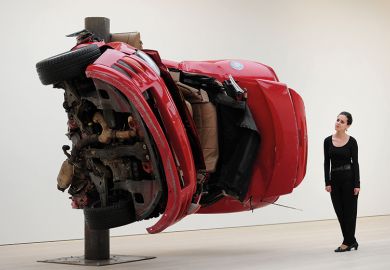Perhaps the death of England’s £9,250 tuition fees system – seemingly imminent in the government’s review of post-18 education – started with that system’s own birth.
The Conservative-led coalition government’s 2010 move to drastically cut public funding for universities, treble fees to £9,000 and abolish educational maintenance allowance triggered a new kind of protest movement.
The student protests of 2010 dominated the news for weeks in November and December that year: fleeting occupation and vandalism of Tory headquarters at Millbank after the first, 50,000-strong protest; a “leaderless” movement surpassing traditional student activism and using social media to promote its political ends, then a novel tactic; occupations at around 50 universities across the country; schoolchildren, further education and university students “kettled” by riot police for hours in freezing temperatures at London protests.
After the fee rise was passed by the House of Commons on 9 December, with 3,000 police surrounding Parliament as protesters massed outside, the protest movement seemed to quickly fizzle out in defeat. But there is now a view among some on the left that the 2010 student protests provided essential fuel for Jeremy Corbyn’s subsequent rise to the Labour leadership (a change in the leadership election rules had something to do with that as well).
It is possible to apply that theory more specifically to higher education: the student protest movement of 2010 helped bring to power a Labour leader with a commitment to abolishing tuition fees and reintroducing maintenance grants. That policy was then perceived – by the prime minister – to have achieved impact with younger voters as Labour achieved a far better than expected result at the 2017 general election, depriving the Conservatives of their majority. Theresa May then personally ordered the post-18 education review in response to Mr Corbyn’s policy, despite sustained opposition from key Tory ministers.
By triggering the student protests, did the system of £9,000 fees – raised to £9,250 in 2017-18 – carry within it the seeds of its own destruction?
There is a dictum that says protest movements “tend to lose, then win”, noted Michael Chessum, a key figure in the 2010 protests as an organiser for the National Campaign Against Fees and Cuts, a student and “education worker” activist group.
Mr Chessum subsequently went on to be a steering committee member in Momentum, the group formed after Mr Corbyn’s leadership win to sustain the spirit of his campaign and apply leftward pressure to Labour. This perhaps echoes the NCAFC’s relationship to the National Union of Students, which, after organising the initial demo that ended at Millbank, was largely sidelined in 2010 (Mr Chessum describes the NUS as being run by “New Labour apparatchiks” in that period).
The 2010 protests “triggered a bigger, wider anti-austerity movement”, in the wake of which “the trade union movement began to radicalise” and Corbynism emerged, said Mr Chessum, a UCL undergraduate in 2010 and now a national organiser for left-wing pro-Remain group Another Europe is Possible.
He observed that many others involved with the UCL occupation that year (visited by Mr Corbyn) have gone on to become key figures within Corbynism, including Ash Sarkar and Aaron Bastani of Novara Media, along with Guardian columnist Owen Jones (a UCL PhD student at the time).
Mr Chessum described the 2010 protests as a “supposedly leaderless movement – very horizontalist, sort of proto-anarchist and in some ways quite anti-political”; yet now “here we are supporting the leader of the Labour party”.
Another outcome he noted was that for “a lot of people who were created [politically] in that period [2010]…there’s no tradition of really radical politics trying to interact with reformist or social democratic politics”.
More widely, Mr Chessum said: “You look at the issues that are prominent in Corbyn’s programme…anti-fees, anti-war, anti-austerity. Where do those issues come from? They come from the massive social movements that built the base of it [Corbynism]. And undoubtedly the student movement of 2010 was a big part of that.”
While Mr Corbyn was an advocate of free education long before 2010, the crucial “prominence” of abolishing fees and reinstating education maintenance allowance in his campaigns was “definitely a product of the mass movement that was built out of [the student protests]”, said Mr Chessum.
Alexander Hensby, a research associate in the University of Kent’s School of Sociology, Social Policy and Social Research, is author of Participation and Non-Participation in Student Activism (2017), which included a survey of student views on the 2010-11 student protests.
He is now beginning work on a book chapter on the linkages between those protests and Mr Corbyn’s Labour.
Dr Hensby, who was starting a PhD in 2010 and “followed the protests”, surveyed protest participants and non-participants from a sample of 22 universities “designed to give a broadly representative spread of regions and campus types”, gaining 2,485 responses.
The survey found that 22 per cent of respondents had participated in the protests (although the definition of participation included signing petitions, for example).
Among student non-participants, 66 per cent said that they supported the protests. This shows that protesters were able to spread support for their cause, and their sense of injustice, to a student audience beyond participants, Dr Hensby said. The protests thus had a “long-term effect on that generation”, he argued.
In terms of links to Mr Corbyn’s Labour, Dr Hensby said that in 2010 “using social media for politics” as the protest movement did “was a relatively new thing in Britain”. He believes that at the 2017 election, “Corbyn’s Labour party had a very similar approach – part of it was using social media to create an event out of political participation; to create a sense of momentum, to create a sense of energy, to create a sense of being part of something”.
Through their shaping influence on Corbynism, might the student protests consequently have led to electoral impact in 2017?
Two weeks prior to the vote, YouGov asked members of the public to remember Labour and Tory manifesto commitments, in their own words without prompting. For Labour, scrapping tuition fees was the most memorable policy, cited by 32 per cent of respondents – and was also fairly popular. There was particularly strong support for the policy among 18 to 24-year-olds, of whom 58 per cent thought it was a good idea.
Researchers have rejected talk of a Labour “youthquake” and increased turnout among younger voters at the election. Nevertheless, perceptions about Labour’s success with younger voters matter – particularly when the prime minister appears to share that perception.
Four months after the election, Ms May addressed fees in her Tory conference speech, dramatically abandoning defence of the £9,000 regime which the Conservatives created to say that “young people take on a huge amount of debt” to study. “We have listened and we have learned,” she added. “So we will undertake a major review of university funding and student financing.”
While Ms May has said that abolishing fees is not on the table (cutting fees to between £6,500 and £7,500 is under consideration, according to leaks) her decision to hold the review appears to be a direct response to Labour policy.
Lord Willetts, who created the £9,000 fees system as universities minister in 2010, said: “There are some people at Number 10 who believe that the pledge to abolish fees and loans was crucial to Corbyn’s success…I don’t think the evidence bears it out.”
He argued that there was not “a direct grievance amongst young people” about tuition fees “because they don’t pay upfront, it’s a graduate repayment scheme” – although he said that there were “misunderstandings” about the system’s impact for individuals’ finances.
Rather, Lord Willetts said, the real “problem for young people” lay in issues highlighted by research by the Resolution Foundation thinktank where he is now executive chair – issues about the absence of pay increases for young people “even in their twenties” and “the difficulty of getting started on the housing ladder”.
He continued: “What then happened with Corbyn [at the election] plays much more into Europe, Brexit, housing market, jobs market. And it is indeed the case that modern Britain is not offering good enough prospects for younger people.” Tuition fees were now “an emblem of a problem that lies elsewhere – that lies above all in the jobs market and the housing market”, Lord Willetts argued.
Dr Hensby also highlighted the totemic political significance of fees. “For young people [Mr Corbyn’s] stand on tuition fees – much like for other people his stance on apartheid – [means] he has always appeared principled and consistent,” he said. The issue “is a point of principle” for Corbyn, “but it has also become quite symbolic in terms of crystallising whether politicians or parties care about young people or not”, Dr Hensby added.
If the government’s review kills off £9,250 fees, other factors will have contributed: the long-standing hostility of Nick Timothy, Ms May’s former adviser, towards the expansion of higher education; growing concerns in the Treasury about the earnings returns from some degrees; and the Office for National Statistics’ decision to reclassify a huge chunk of student loan lending as government spending.
But perhaps it is the confluence of these fault lines – including the one that started with the 2010 student protests and led on through Corbynism – that will see the ground collapse beneath £9,250 fees.
Regardless of the review’s conclusions, if tuition fees were eventually toppled entirely by a Labour government, the student protesters of 2010 could claim to have started the pushing.
And perhaps Conservative anguish over their collapsing support among younger voters can be traced back to the same point – even if other causes of dissatisfaction among younger voters such as jobs or housing may be more fundamental, they may not have quite the same totemic, symbolic status that the protesters gave to fees. Maybe 2010, and the apparent emergence of a generation of more radical students in universities, even led on to the anxieties that prompt Conservative ministers to attack universities and students’ unions over free speech and their supposed hostility to right-wing ideas.
The noise of the 2010 student protests – megaphone-led chants, bass thumping from mobile sound systems, police helicopters circling overhead – might echo through higher education policy and British politics for years to come.
POSTSCRIPT:
Print headline: Victory for the fees protesters at last?
Register to continue
Why register?
- Registration is free and only takes a moment
- Once registered, you can read 3 articles a month
- Sign up for our newsletter
Subscribe
Or subscribe for unlimited access to:
- Unlimited access to news, views, insights & reviews
- Digital editions
- Digital access to THE’s university and college rankings analysis
Already registered or a current subscriber?








